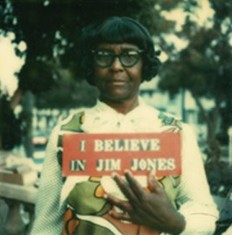 For anyone with even a passing interest in cult psychology, San Diego State University’s Jonestown Archive is well worth a thorough gander. Our favorite section, of course, is a compendium of primary sources that date back to Jim Jones’s earliest days in Indiana. Among the choice morsels contained therein is a petition that all members of Jonestown were compelled to sign in 1978. Its title is fairly self-explanatory: “The Undersigned Desire to Emigrate to the Soviet Union.” As the SDSU curatorial materials explain:
For anyone with even a passing interest in cult psychology, San Diego State University’s Jonestown Archive is well worth a thorough gander. Our favorite section, of course, is a compendium of primary sources that date back to Jim Jones’s earliest days in Indiana. Among the choice morsels contained therein is a petition that all members of Jonestown were compelled to sign in 1978. Its title is fairly self-explanatory: “The Undersigned Desire to Emigrate to the Soviet Union.” As the SDSU curatorial materials explain:
Even though Jones discussed other unnamed options for emigration as late as a few weeks before the end of Jonestown, the focus of a projected move quickly fell on the Soviet Union. Jonestown residents were encouraged to take Russian language classes and to greet each other as “Comrade” or by its Russian word “tovarisch.” Jones went so far in one tape from late August 1978 as to insist that everyone was required to say “One phrase in Russian” to be fed that night, and “[i]f you can’t say it, back to the end of the line you’ll go.”
In addition, most of the news which Jones read over the Jonestown loudspeakers came from Eastern Bloc sources, if not Radio Moscow itself. His lengthier analyses – the articles beyond the daily headlines – mostly dealt with the history of the Soviet Union, including its stand against the Nazis in World War II.
Most of the efforts to teach the people of Jonestown some elementary Russian phrases and a general history of Soviet Russia were geared towards the October 2, 1978 arrival of Soviet consular Feodor Timofeyev in Jonestown. The community wanted to showcase its strength and vitality, its allegiance to socialism, and its familiarity with the Russian people whom they said they aspired to join.
The transcript of one of Jones’s Russian lessons can be found here. Such tragic irony in the fact that the very first phrase he wanted his followers to learn was “I want peace.”
(Image via Undercover Black Man)


Jordan // Jan 4, 2010 at 11:46 am
For a really good book on the subject of spiritual gurus and the reasons why people follow them, check out Anthony Storr’s “Feet of Clay”. While it would need a lot more work to flesh out, I generally agree with his conclusion that individuals have different tolerances for doubt. A low tolerance for doubt tends to lead people towards sources of certainty, whether those are ideologies, religions or other systems for living.
http://www.amazon.com/Feet-Clay-Anthony-Storr/dp/0684834952/ref=sr_1_3?ie=UTF8&s=books&qid=1262623381&sr=1-3